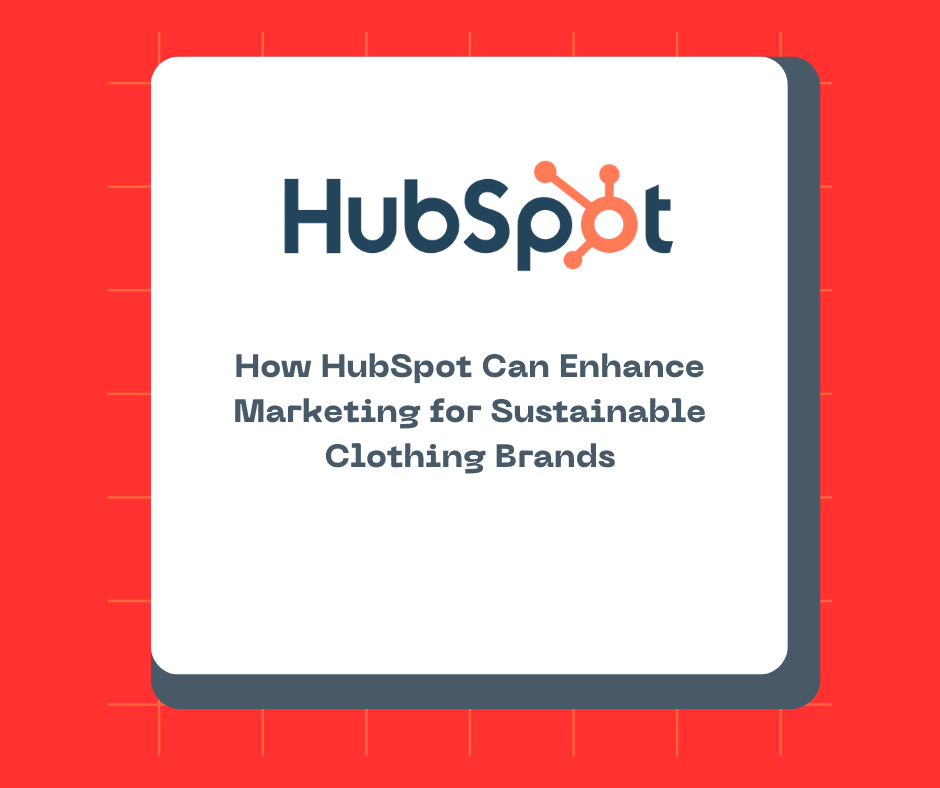In the fashion industry, sustainability has transitioned from a niche appeal to a central component of brand identity and consumer choice. Sustainable clothing brands face the unique challenge of not only marketing their products but also communicating their ethical and environmental commitments effectively. HubSpot, with its robust suite of inbound marketing tools, provides powerful solutions to these challenges. This article explores how sustainable clothing brands can leverage HubSpot to enhance their marketing efforts, attract a more engaged audience, and drive meaningful growth.
Understanding the Sustainable Clothing Market
The sustainable clothing market appeals to a growing demographic of environmentally and socially conscious consumers. These consumers are often well-informed, passionate about environmental causes, and meticulous about the brands they support. They look for transparency, authenticity, and genuine sustainability in their clothing choices.
Challenges Faced by Sustainable Clothing Brands
- Educating Consumers: Many consumers are still learning about what makes clothing sustainable.
- Building Trust: Greenwashing is a common issue in the industry, making consumer trust hard to earn.
- Segmentation and Targeting: Effective marketing must address various consumer segments within the broader ethical consumption space.
- Maintaining Engagement: Continuously engaging customers in a meaningful way beyond the initial purchase.
Leveraging HubSpot for Effective Marketing
HubSpot offers an array of tools that can help sustainable clothing brands tackle these challenges effectively. Here’s how these tools can be applied:
1. Robust CRM for Deep Customer Insights
Understanding your customer base is crucial for any brand, especially for those in the niche market of sustainable fashion. HubSpot’s CRM system allows brands to store and manage detailed customer data, which can be used to tailor marketing strategies and build stronger relationships.
- Strategy Example: Utilize HubSpot’s CRM to track customer purchases, preferences, and interactions. This data can help create personalized marketing campaigns that resonate with individual values, such as animal welfare, fair trade, or zero waste, enhancing the relevance of communications.
2. Content Marketing Powered by HubSpot’s CMS
Content marketing is particularly effective for sustainable brands needing to educate and engage their audience. HubSpot’s Content Management System (CMS) can help brands create, manage, and optimize their content strategy to attract and retain a dedicated following.
- Strategy Example: Develop an educational blog series or guides on sustainable practices within the fashion industry using HubSpot’s CMS. Topics might include how to care for sustainable garments, the benefits of organic materials, or stories behind the sourcing of materials. Use HubSpot’s SEO tools to ensure this content reaches a wide audience.
3. Personalized Email Marketing Campaigns
Email marketing remains a powerful tool for direct communication with customers. HubSpot’s email tools enable the creation of personalized, automated email campaigns that can keep customers engaged over time.
- Strategy Example: Segment your email list by customer behavior and preferences captured in your CRM. Send personalized emails with content tailored to each segment, such as special offers on products made from recycled materials to customers who have shown an interest in recycling, or updates about the ethical sourcing of new products to those concerned with fair labor practices.
4. Social Media Integration
Social media is a crucial channel for sustainable brands, offering a platform for storytelling and community building. HubSpot’s social media tools can streamline the management of multiple social media accounts, making it easier to maintain an active and consistent presence.
- Strategy Example: Use HubSpot to schedule regular posts and campaigns across all your social platforms, focusing on sharing the sustainable stories behind your products, customer testimonials, and interactive content like polls or "ask us anything" sessions to increase engagement.
5. Utilizing Marketing Automation for Engagement
HubSpot’s marketing automation features can help sustainable clothing brands maintain continuous engagement with their audience, nurturing customer relationships and building loyalty.
- Strategy Example: Set up automated workflows in HubSpot to send a series of welcome emails to new subscribers, introducing them to your brand’s mission and sustainable practices. Include a special discount or offer on their first purchase to convert interest into action.
6. Advanced Analytics for Strategic Decision Making
With HubSpot’s analytics, sustainable clothing brands can measure the effectiveness of their marketing strategies and gain insights into customer behavior and preferences.
- Strategy Example: Analyze which types of content generate the most engagement, which marketing channels are most effective, and what the customer conversion paths look like. Use these insights to refine your marketing efforts, focusing more on what works best to drive both reach and conversion.
Best Practices for Sustainable Clothing Brands Using HubSpot
- Transparency First: Use HubSpot’s various tools to communicate your brand’s sustainable practices and supply chain transparency clearly and frequently.
- Educate and Engage: Regularly educate your audience about sustainability in the fashion industry. Use every touchpoint as an opportunity to inform and engage.
- Community Building: Foster a sense of community among your customers. Use HubSpot’s tools to create and manage events, workshops, or live discussions about sustainability.
- Feedback Loop: Encourage and manage customer feedback using HubSpot’s survey tools. This feedback is invaluable for improving your products and marketing strategies.
Conclusion
For sustainable clothing brands, effective marketing is about much more than selling products; it’s about promoting a lifestyle and a set of values. HubSpot provides the tools necessary to engage deeply with consumers, build lasting relationships, and promote sustainable practices effectively. By integrating HubSpot into their marketing strategies, sustainable clothing brands can achieve greater visibility, enhance customer engagement, and drive meaningful change in the fashion industry.
Schedule your training session here and comment “Need Training” on the request form.

Comments